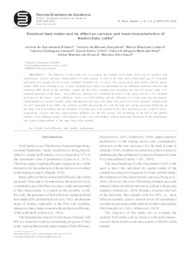Residual feed intake and its effect on carcass and meat characteristics of feedlot Zebu cattle.
Residual feed intake and its effect on carcass and meat characteristics of feedlot Zebu cattle.
Author(s): RIBEIRO, J. do S.; GONÇALVES, T. de M.; LADEIRA, M. M.; CAMPOS, F. R.; TULLIO, R. R.; MACHADO NETO, O. R.; OLIVEIRA, D. M. de; BASSI, M. S.
Summary: The objective of this study was to evaluate the residual feed intake (RFI) and its relation with performance, carcass and meat characteristics of Zebu animals. A total of 40 Zebu steers with initial age of 18 months and initial live weight of 350 kg were confined in feedlot for 112 days. The average daily gain (ADG) and dry matter intake (DMI) were obtained every 14 days. Residual feed intake was determined by the difference between observed and predicted DMI, based on the metabolic weight and the ADG. Animals were classified into the RFI groups: high (>0.5 standard deviation of the mean - least efficient), medium (±0.5 standard deviation of the mean) and low (<0.5 standard deviation of the mean - most efficient). Daily cost with feeding and per kilogram of weight gain was determined. Characteristics of carcass (weight, yield, subcutaneous fat) meat (pH, shear force and color) were assessed. Animals with low RFI presented lower DMI. The variation in DMI between the low and the high RFI groups promoted difference in the daily cost with feeding and per kilogram of weight gain, with animals of low RFI presenting costs 5 and 9% lower, respectively. Carcass and meat characteristics differed over the RFI groups. The knowledge of the RFI of the animals enables a more efficient system, with reduction in the costs with feeding, without promoting alterations on the performance and carcass characteristics of the meat from Zebu animals.
Publication year: 2012
Types of publication: Journal article
Keywords: Feed efficiency, Performance, meat quality
Observation
Some of Embrapa's publications are published as ePub files. To read them, use or download one of the following free software options to your computer or mobile device. Android: Google Play Books; IOS: iBooks; Windows and Linux: Calibre.
Access other publications
Access the Agricultural Research Database (BDPA) to consult Embrapa's full library collection and records.
Visit Embrapa Bookstore to purchase books and other publications sold by Embrapa.

